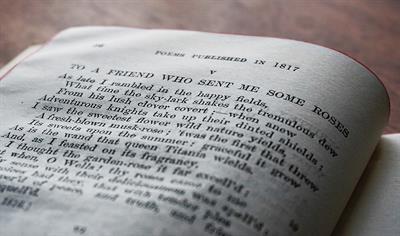PDF chapter test TRY NOW
Poetry is a form of literature where language, and words in particular, is picked and arranged in a desired manner to create distinctive meaning, style, sound, and rhythm.

A page (from a book of poems) displaying Keat's To a Friend who sent me some Roses
Did you know that poetry is the oldest form of literary art in the world? Most of the earlier forms of literature were moulded in the form of poems. Folk songs or tales, ballads, and even dramas were structured in a poetic form.
Poetry also goes by the name poem or verse. It can either contain a rhyme scheme and a strict meter or maybe free of both. The latter is called a free verse.
Poetry also goes by the name poem or verse. It can either contain a rhyme scheme and a strict meter or maybe free of both. The latter is called a free verse.
There are different forms of poems such as sonnet, epic, lyric, ode, elegy, rhyme, blank verse, and ballad.
Poetic forms based on the number of lines in a stanza:
Couplet = a two-line stanza.
Tercet = a three-line stanza.
Quatrain = a four-line stanza.
Cinquain = a five-line stanza.
Sestet = a six-line stanza.
Brevity: It can be concise. It is possible to create more meaning, depth, and emotion with a limited number of words.
Meaning: Poetry is like a puzzle. One can unearth any amount of meanings from a poem.
Sentence pattern: Unlike prose, poetry does not follow the conventional sentence pattern. The words are usually in a jumbled order.
Rhythm: Poetry contains a rhythm that is not typically seen in prose pieces. The meter, rhyme, or the placement of words provide rhythm to the poem.
Meaning: Poetry is like a puzzle. One can unearth any amount of meanings from a poem.
Sentence pattern: Unlike prose, poetry does not follow the conventional sentence pattern. The words are usually in a jumbled order.
Rhythm: Poetry contains a rhythm that is not typically seen in prose pieces. The meter, rhyme, or the placement of words provide rhythm to the poem.
Example:
Examples of rhyming poetry:
O Captain! my Captain! our fearful trip is done;
The ship has weather’d every rack, the prize we sought is won;
The port is near, the bells I hear, the people all exulting,
While follow eyes the steady keel, the vessel grim and daring:
O Captain! my Captain! our fearful trip is done;
The ship has weather’d every rack, the prize we sought is won;
The port is near, the bells I hear, the people all exulting,
While follow eyes the steady keel, the vessel grim and daring:
~ an extract from "O Captain! My Captain" by Walt Whitman*
You may write me down in history
With your bitter, twisted lies,
You may tread me in the very dirt
But still, like dust, I’ll rise.
You may write me down in history
With your bitter, twisted lies,
You may tread me in the very dirt
But still, like dust, I’ll rise.
~ an extract from "Still I Rise" by Maya Angelou*
Example:
An example of a free verse:
A wanderer is man from his birth.
He was born in a ship
On the breast of the river of Time;
Brimming with wonder and joy
He spreads out his arms to the light,
Rivets his gaze on the banks of the stream.
He was born in a ship
On the breast of the river of Time;
Brimming with wonder and joy
He spreads out his arms to the light,
Rivets his gaze on the banks of the stream.
~ an extract from "The Future" by Mathew Arnold**
Reference:
* Poem courtesy: https://medium.com/@EmEmbarty/31-of-the-best-and-most-famous-short-classic-poems-of-all-time-e445986e6df
** https://www.poetryfoundation.org/poems/43590/the-future
